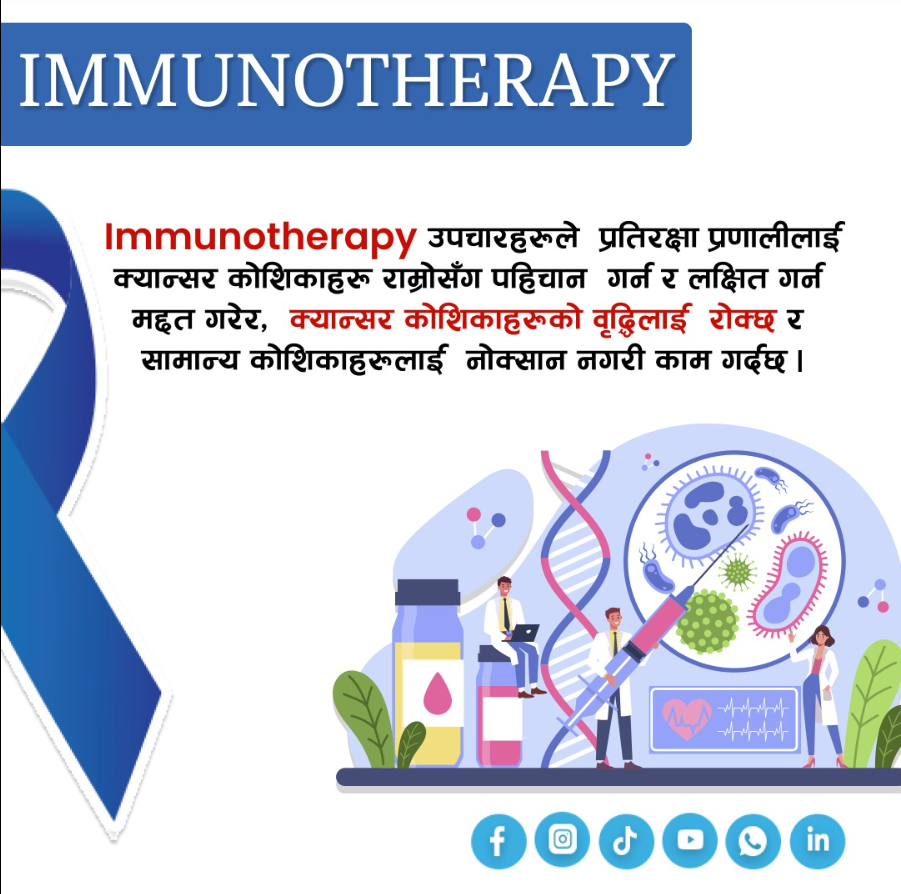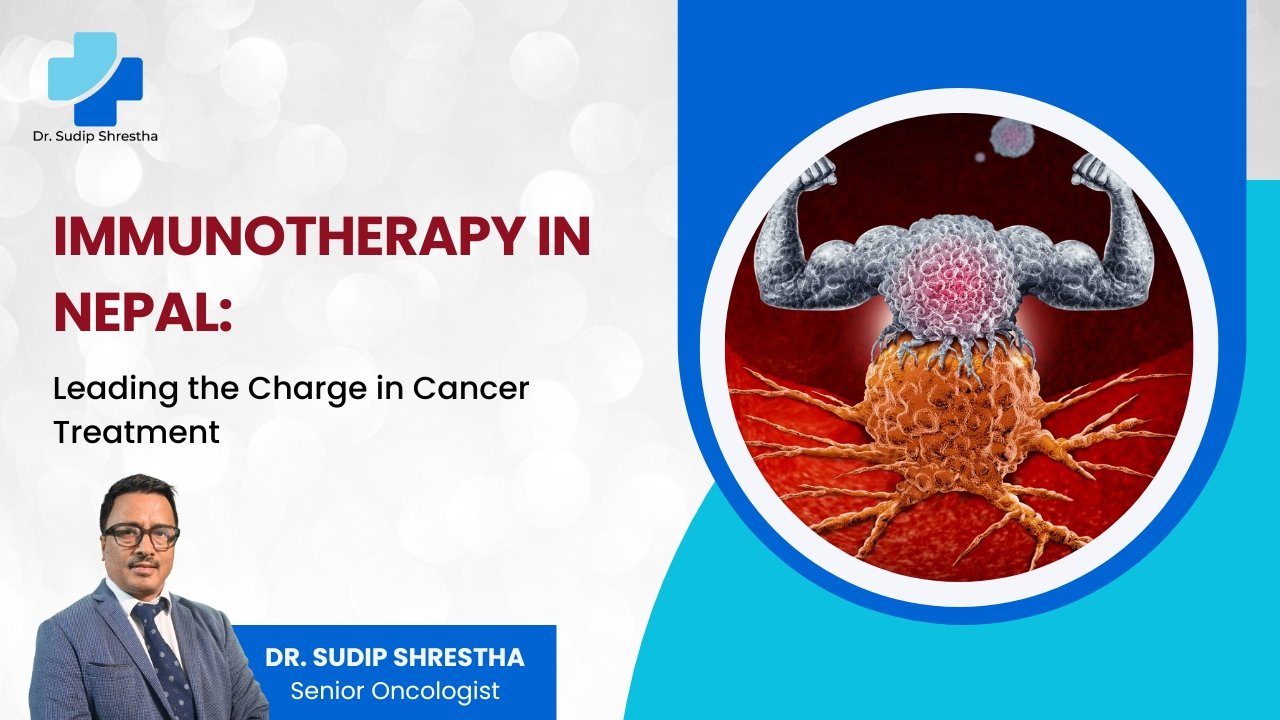Cancer treatment has evolved significantly over the years, moving from traditional methods to more advanced and targeted therapies. Among these innovative approaches, immunotherapy stands out as a groundbreaking treatment that harnesses the body’s immune system to fight cancer. In Nepal, immunotherapy is gaining traction, offering new hope to cancer patients. A pivotal figure in this field is Dr. Sudip Shrestha, a renowned oncologist whose contributions are shaping the future of cancer care in the country.
Understanding Immunotherapy
Immunotherapy, also known as biologic therapy, uses the body’s immune system to identify and destroy cancer cells. Unlike traditional treatments such as chemotherapy and radiation, which directly target cancer cells, immunotherapy boosts the immune system’s natural defenses. This approach can result in fewer side effects and more durable responses, as the immune system can remember and attack cancer cells if they return.

The Role of Immunotherapy in Cancer Treatment
Immunotherapy works in several ways:
- Checkpoint Inhibitors: These drugs help the immune system recognize and attack cancer cells by blocking proteins that prevent immune cells from attacking the cancer.
- CAR T-cell Therapy: This involves modifying a patient’s T-cells to better recognize and attack cancer cells.
- Cancer Vaccines: These stimulate the immune system to attack specific cancer cells.
- Cytokines: These are proteins that enhance the immune system’s response to cancer.
The Emergence of Immunotherapy in Nepal
In Nepal, the adoption of immunotherapy is relatively recent but rapidly growing. The introduction of this advanced treatment has been a beacon of hope for many patients, particularly those with cancers that are resistant to traditional treatments. The success of immunotherapy in Nepal can be largely attributed to the efforts of pioneering oncologists like Dr. Sudip Shrestha.
The cost of immunotherapy in Nepal can vary widely depending on the type of cancer, the specific treatment plan, and the hospital. On average, immunotherapy can range from NPR 300,000 to NPR 1,200,000 per cycle. It’s essential to discuss the financial aspects with your oncologist and explore available financial assistance programs.
Immunotherapy injections, such as checkpoint inhibitors, can cost between NPR 100,000 to NPR 400,000 per dose. The total cost depends on the number of doses required over the course of treatment.
Dr. Sudip Shrestha: A Pioneer in Cancer Care
Dr. Sudip Shrestha is a name synonymous with excellence in cancer treatment in Nepal. With extensive training and experience in oncology, Dr. Shrestha has been at the forefront of introducing and implementing immunotherapy in the country. His dedication and commitment to patient care have earned him recognition both nationally and internationally.
Dr. Sudip Shrestha is the present Executive Chairman of Nepal Cancer Hospital and Research Center. He started his journey in the medical field back in 1985 AD when he started his MBBS from Jawaharlal Institute of Postgraduate Medical Education and Research (JIPMER), University of Madras, India. Gathering a lot of experience and respect in the field over the years, he has been actively involved since the establishment of Bhaktapur Cancer Hospital (2nd cancer hospital in Nepal) to present day, where he is working hard as the Executive Chairman of Nepal Cancer Hospital and Research Center to bring the state of the art technology for treating cancer all under one roof.
While there are many skilled oncologists in Nepal, Dr. Sudip Shrestha is highly regarded for his expertise in immunotherapy and comprehensive cancer care. His extensive training, commitment to patient care, and pioneering efforts in introducing advanced cancer treatments make him a leading figure in the field.
June as Cancer Immunotherapy Month: A Unified Fight Against Cancer
June is celebrated as Cancer Immunotherapy Month, a time dedicated to raising awareness about the transformative potential of immunotherapy in cancer treatment. This month highlights the advancements in immunotherapy, educates the public and healthcare professionals, and celebrates the successes of immunotherapy in improving the lives of cancer patients. The goal is to unite the global community in the fight against cancer, sharing knowledge and inspiring hope through the stories of those who have benefited from this innovative treatment.
Impact of Immunotherapy on Cancer Treatment in Nepal
The impact of immunotherapy in Nepal has been profound. For many patients, it has provided a new lease on life, especially those with cancers that have not responded to other treatments. Immunotherapy has shown remarkable success in treating various types of cancers, including melanoma, lung cancer, kidney cancer, and certain types of lymphoma.
Patients undergoing immunotherapy in Nepal have reported significant improvements in their quality of life. The side effects of immunotherapy are generally milder compared to traditional treatments, and the results are often more durable. This has not only improved survival rates but also allowed patients to lead more normal lives during and after treatment.
Immunotherapy in Nepal has shown promising results, especially in treating cancers like melanoma, lung cancer, and certain types of lymphoma. The success rate varies depending on the cancer type and individual patient factors. In many cases, it has led to long-term remission and improved survival rates.
Conclusion
Immunotherapy in Nepal represents a significant advancement in cancer treatment, offering new hope to patients. With pioneers like Dr. Sudip Shrestha leading the way, the country is witnessing a transformation in cancer care. While challenges remain, the ongoing efforts to expand and improve immunotherapy services promise a brighter future for cancer patients in Nepal. If you or a loved one is seeking immunotherapy in Nepal, Dr. Sudip Shrestha is the expert to consult. His extensive experience, coupled with his commitment to patient care and advanced training, makes him a leading figure in this field. Dr. Shrestha’s contributions are a testament to the impact that one individual’s vision and dedication can have on the lives of many, bringing hope and healing to those battling cancer.




1 thought on “Immunotherapy in Nepal: Leading the Charge in Cancer Treatment”